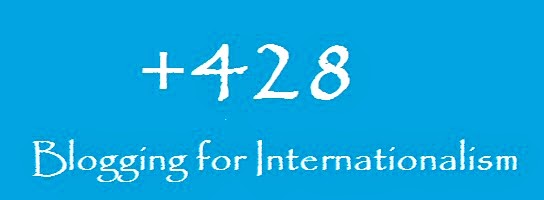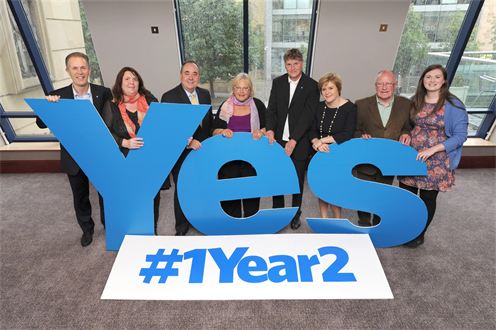Personally I find the whole identity discussion a wee bit bewildering. It's helpful if the nations of Great Britain have a strong sense of its collective relationship or even identity. But for most people on this side of the Atlantic at this corner of Europe it's really something quite subtle. You sense you've returned home from Florida or Spain when after weeks of sunshine you emerge from Heathrow and start driving home sweeping away God's tears with your windscreen wipers while reflective rounded road signs direct you back to the town where you live in a rather no-nonsense fashion. Car registrations numbers are no longer narrow and metallic but bold and plastic. After a couple of weeks of sunshine illuminating the golden sands in front of the splendid turquoise sea overlooked by glaring white hotels and villas with their balconies and swimming pools now you're driving past dull grey stone houses with slanted slated roofs and you're thinking miserably about how you have to go back to work the next day. At least you can look forward to cooking the toad-in-the-holes you haven't been able to eat for the last fourteen days and take some comfort in being able to switch on the telly to watch Mrs Brown's Boys whilst your cat purrs on the rug next to you. You get the picture. In fact this is exactly the same home-coming blues you would more or less feel if you landed at Prestwick, Cardiff or even Shannon.
So let's consider what exactly Britain means. By legal definition Great Britain is England, Scotland and Wales, that is to say the countries of the island of Great Britain. As that combined unit has, for the last 300 years, been within one state, the island (or islands) and the state are seemingly interchangeable ideas. For that reason it seems hard not to assign British as an adjective for the island of Great Britain regardless of whether or not it's one sovereign state or two or three. And there's already a precedence for this and you don't have to look very far - Ireland.
Ireland may be the name for the country that is the Republic of Ireland. Irish may be the adjective for that country. But Ireland is considered equally the name for the whole island and Irish is used just as much as the adjective for the island of Ireland. Many people in Northern Ireland don't like to call themselves Irish because they don't feel associated with the Irish state. Yet if they embrace the idea of Ulster they embrace a form of Irishness albeit a northern kind. And as both communities integrate more closely there is little to differentiate culturally between two groups of people. Northern Irish people are said to be among the friendliest people around - much like their southern neighbours. And if they all enjoy visiting bars at the weekends for a bit of craic and enjoy listening to folk jams and getting drunk - well that's very Irish. Personally I just think of anyone from Northern Ireland as Irish it just seems to come naturally.
The island that Better Together want you to think is not called Great Britain
Personally I regard myself as British. Why? Well first there is the small matter that I am a UK citizen with the said passport. Not in itself enough to feel British according to many. But add to that the fact that on this side of the North Sea my family background is southern English and I grew up variously in Cumbria and Wigtownshire I have an upbringing that very much straddles the border. I feel British because I have grown up in places that speak English as a first language but are quite definitely not American. Then factor in that I once was in favour of a united Great Britain and you'll see what I'm getting at. It was just a few months after Montenegro voted to become independent in 2006 that I started wondering if Scotland and Wales should also be independent and therefore if Great Britain should be three sovereign states instead of just one. I didn't suddenly change my cultural pursuits as a result they stayed exactly the same and nor did I start feeling un-British. If I'd grown up my whole life understanding Britain and British to refer to England, Scotland and Wales in combination then any notion of them being in the same state was secondary. Ergo I felt British regardless of my constitution viewpoint. If Britishness is a cultural thing then I hardly think it is anything to do with politics.
But here's my point. If Britain is three nations then it's three nations. If you want to tell people you're British, that is to say you're from Great Britain, you should be able to do that just by saying you're from Scotland. A feeling of Scottishness is itself a feeling of Britishness. It's just a lot more specific.
The English seem to have got the hang of this principle given they talk about being English and being British quite interchangeably. Yet in Scotland ask many people to define Britishness and there seems to be a need to talk about what they have in common with the English. So conventionally it appears the common denominator in Britishness is England while Scottish culture is it seems less a part of the cannon of British culture. The Highlands of Scotland may be quite far away from the heartland of Britain but what makes them an inferior part of Great Britain? Nothing. So being British can mean as little as being Scottish or as much as being a combination of English, Scottish and Welsh. If you're only Scottish then there's very little reason to say Scottish and British. To do so is like phoning up a friend and saying "I'm in my room. And I'm also in my house." "Well, never!" comes the response "I thought you had worked out a way to jettison your room so it could fly all the way to another part of town!"
That is why I get irritated by the unionists who assert that Britain is a nation and no other definition of Britain is acceptable and you can't call yourself British if you vote for independence. The unionists have no right or business whatsoever in dictating how we define ourselves post-independence, I'll call myself British if I feel like it! I also feel there are countless ways to stand shoulder-to-shoulder with our English and Welsh cousins without the union. It is insulting to suggest that voting for Scotland to be a fully self-governing nation is wanting nothing to do with people south of the border. In fact quite the reverse is the case when you consider those are the same people that often Westminster simply ignores. I for one would be among the first coachload of Scottish citizens to travel south to Milford Haven or Devonport to protest if either of those places is where Trident is chosen to be relocated. I don't just want nuclear weapons out of Scotland. I want them away from the very shores of my island and indeed all these isles. I want every part of Great Britain to be successful and prosperous but that will only happen with governments that understand how to make society balanced and equal.
Only one year to go
We now have less than year to go now before the big vote. Many of us may support independence because Scotland is a nation but our case for independence has to be about what is best for our country. And it so happens that we would be a wealthy country, wealthy enough to invest where it matters the most to get our economy running better and for the gap between rich and poor to decrease. Many of us also feel Scottish independence will help the momentum towards a fully democratic and just society across our isles. The late Stephen Maxwell observed that identity can only play a secondary role in a reasoned debate. So let us go out there and tell people on the door steps and in the streets that what we stand for is social justice, a fairer society and let us make sure that they ignore any scaremongering about identity. Because if they take that to heart they will switch off from Better Together with its moronic claims about 'being asked to choose between Scottish and British' and start paying more attention to the more serious message about the opportunities that independence could provide.
Because when they do two simple words will start to form in their minds:
Why not?



No comments:
Post a Comment